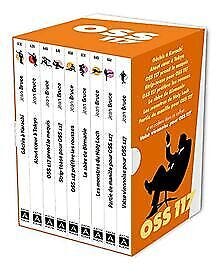Enter OSS 117 - the literary secret agent who inspired Bond and beyond
The famed British spy and a whole host of Cold War and modern fictional anti-heroes owe an unacknowledged debt to French author Jean Bruce, by Adam Jezard
Having read a few of the adventures of Hubert Bonisseur de la Bath, better known by his codename OSS 117, I'm struck by how influential these books were on spy fiction in general and how little known they are outside France.
The origins of Bond are certainly here. This good-looking, athletic and sexually promiscuous espionage agent appeared before Bond and Ian Fleming, a French speaker and frequent visitor to France, could not have been unaware of Hubert's existence as 117 was a publishing phenomenon before Bond hit print.
But what strikes me is how even more heartless and callous than 007 this French counterpart is. He exploits vulnerable women for his own ends and his mission's, callously puts innocents in harm's way and leaves others to pick up the pieces of the carnage he leaves behind him, if indeed there's anything left to pick up.
But while the similarities with the Bond of the books are many, there are also differences. 117 stories take place in a more noticeably real world, with the author leaving footnotes about real events to guide you through the historical and political backgrounds to his stories.
There's no real depth to his tales, the procedural tone is more the spy fiction equivalent of Georges Simenon's Maigret tales than Fleming's outrageous plots, though those who've never read Fleming may be surprised how procedural his stories can be compared to the flashier cinematic adaptations.
To my regret, I've only belatedly come to realise that much of the British and US spy fiction I grew up reading owes a debt to writer Jean Bruce. Len Deighton's nameless spy (Harry Palmer in the film adaptations), which Deighton wrote the first of while sojourning in France, owes a vast debt, while the Matt Helm books by Donald Hamilton, both in tone and structure, are more exact mirrors of Bruce's work (the films of those with Dean Martin bear almost no resemblance to the books).
But the violent and heartless hero in the 117 books is almost utterly without the redeeming features of Helm, Bond or "Palmer", who all show some signs of caring for others at some point. Hubert literally doesn't and in his adventures he's often accompanied by a back-up man even more heartless than he.
In this, and the one redeeming feature of Hubert, his genuinely funny quips, Bruce himself owes a debt to other genre writers, particularly the Saint stories of Leslie Charteris. Simon Templar's relationship with a succession of dim-witted and thuggish sidekicks provides much of the humour in Charteris' early writing, while the Saint of the early books is a cold-blooded killer, not the gentlemanly Roger Moore figure most TV viewers know. Bruce is for once the fan-like imitator rather than the imitated. Similarly the spare style owes much to the likes of writers much admired in France like Somerset Maugham and Eric Ambler.
The Bond of the books is, unlike the film version, curiously without much witty repartee, despite Fleming once saying they were full of "schoolboy humour", the comedy in the early films from Goldfinger on deliberately copied from the infamously more humorous TV show The Saint starring one Roger Moore.
Perhaps more important culturally, Bruce's writing acknowledges the place of France in the world for, although he is a French writer writing in French, his anti-hero Hubert Bonisseur de la Bath is an American agent (OSS being the forebear of the CIA) with an aristo French background (from Lousianna, y'awl). He doesn't make the mistake of Eton narcissist Fleming in painting his hero as a representative of a nation that still thinks it is equivalent to the US in terms of military might and political heft instead of a fading world power. Here, psychologically, Bruce did a huge favour to the French psyche as the image of Bond strutting the cinematic world stage has arguably done more to delude sections of the British public that the UK is still a world power on an equal footing with the US than even the equally deluded UK right-wing press. The disastrous effects of the toxic masculinity of Bond on the Eton and public-school educated political class of Britain can't be underestimated, as the public and private lives of current and recent past incumbents in parliament show.
The effects of Jean Bruce's work in the spy genre are not properly acknowledged and no literary student looking at the work of Fleming, Deighton, Le Carré and Donald Hamilton and their later imitators, such as Lee Child's Jack Reacher, should ignore the influence of Bruce on these parvenus. Both the books and the 1960s' 117 screen adventures have cast a considerable and lasting shadow on a genre that has had an immense influence on literature, cinema and the real world, and Bruce's contribution demands recognition.




